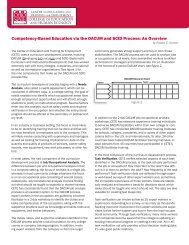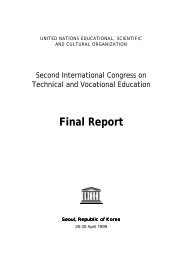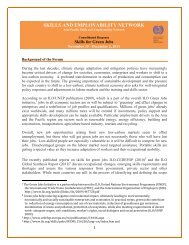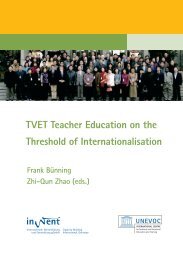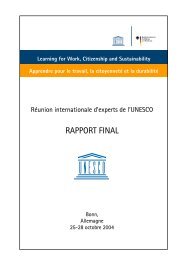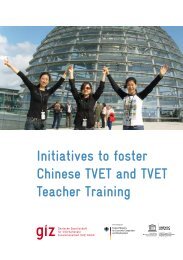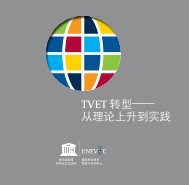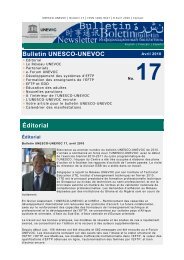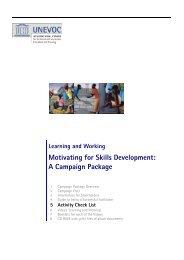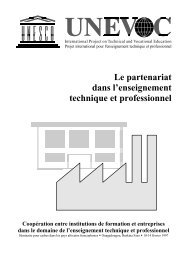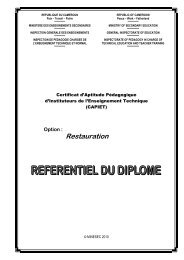Corporate HRD and Skills Development for ... - Unesco-Unevoc
Corporate HRD and Skills Development for ... - Unesco-Unevoc
Corporate HRD and Skills Development for ... - Unesco-Unevoc
Create successful ePaper yourself
Turn your PDF publications into a flip-book with our unique Google optimized e-Paper software.
Qualifications Proposed by MOLSW (2007)<br />
– Vocational Qualification (Article 11):<br />
1. Attestation: Basic <strong>Skills</strong> training of less than 3 months<br />
2. Qualification Level 1: Vocational Training between 3-6 months<br />
3. Qualification Level 2: Vocational Training between 6-12 months<br />
4. Qualification Level 3: Vocational Training between 12-18 months<br />
5. Qualification Level 4: Vocational Training > 2 years<br />
– St<strong>and</strong>ard <strong>for</strong> Skilled Labour (Article 19):<br />
1. Skilled Labour Level 1: Semi- skilled worker<br />
2. Skilled Labour Level 2: Skilled worker<br />
3. Skilled Labour Level 3: Tradesman<br />
4. Skilled Labour Level 4: Supervisor<br />
Status of St<strong>and</strong>ard Setting<br />
– NTC set up in 2002<br />
– TWG (Wood & Furniture, Hotel & Restaurant, Construction, H<strong>and</strong>icraft, Textile, <strong>and</strong><br />
Printing)<br />
– 3 occupational st<strong>and</strong>ards endorsed by NTC chairman: wood & furniture, h<strong>and</strong>icraft, <strong>and</strong><br />
hotel & restaurant<br />
– 4 curricula developed according to the st<strong>and</strong>ards: wood & furniture, h<strong>and</strong>icraft, hotel &<br />
restaurant, <strong>and</strong> printing<br />
– DACUM <strong>and</strong> Competency Based Training has been operational in Laos since 1990, with<br />
support of UNESCO<br />
– St<strong>and</strong>ard development started in 2002 in the Hospitality sector, supported by Australia,<br />
<strong>and</strong> implemented by the William Anglis Institute of TAFE, Melbourne & Hotel<br />
Association<br />
– WS on St<strong>and</strong>ard setting August <strong>and</strong> October with the support of InWEnt & GTZ<br />
Challenges of TVET<br />
– Low quality <strong>and</strong> insufficiency of teaching staff <strong>and</strong> graduates<br />
– Coordination among TVET stakeholders <strong>and</strong> providers is weak<br />
– Lack of financial support <strong>for</strong> hardware <strong>and</strong> software<br />
– Many TVET institutions are focusing on HD programmes instead of skilled level courses<br />
with low quality <strong>and</strong> insufficient skilled work<strong>for</strong>ces.<br />
– Mismatch of dem<strong>and</strong> <strong>and</strong> supply.<br />
42



